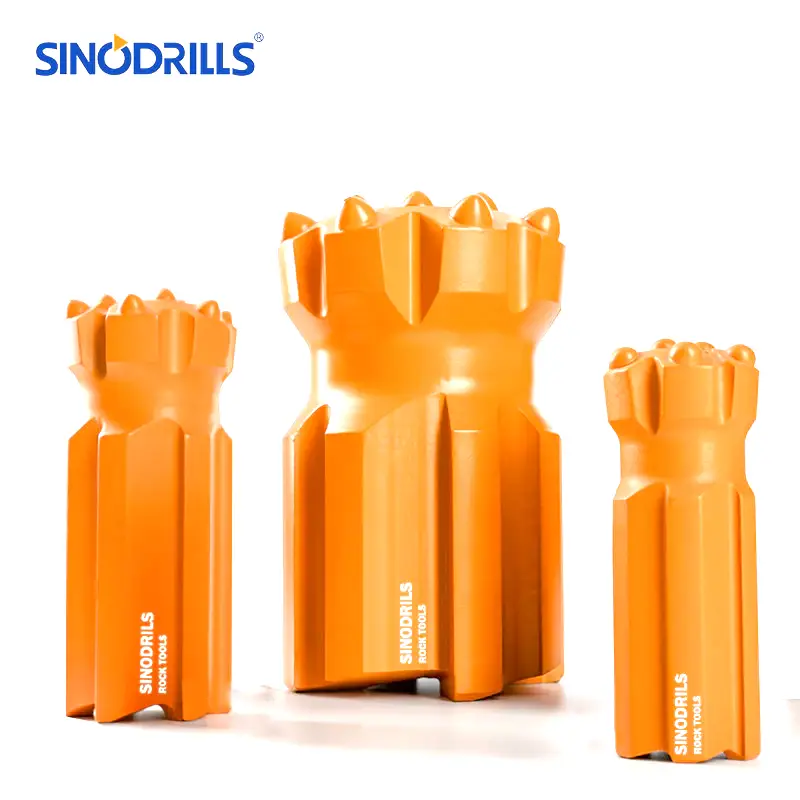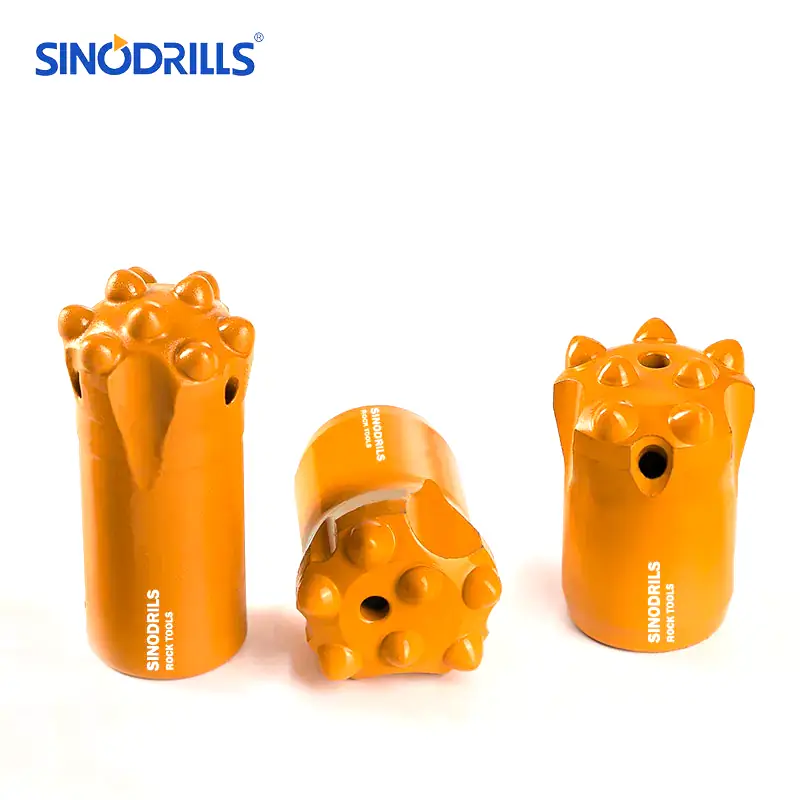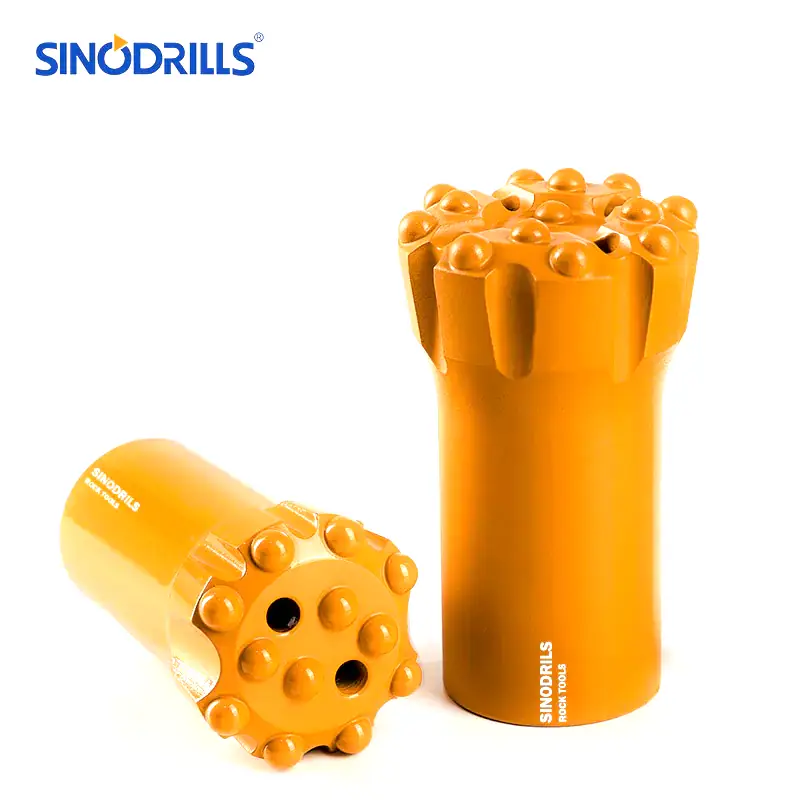Drilling through tough rock formations requires the right tools to ensure efficiency, precision, and safety. Selecting the appropriate drill bit is critical, as each rock type—hard, soft, or abrasive—demands specific cutting structures, materials, and designs. Understanding these factors helps reduce equipment wear and improve drilling performance.
Different rock formations pose unique challenges for drilling projects. Hard igneous rocks require durable, wear-resistant bits, while softer sedimentary formations benefit from faster penetration bits. By matching drill bit types to specific rock conditions, operators can achieve optimal drilling speed, minimize downtime, and ensure accurate, cost-effective results across mining, construction, and geological exploration projects.
What are Rock Formations?
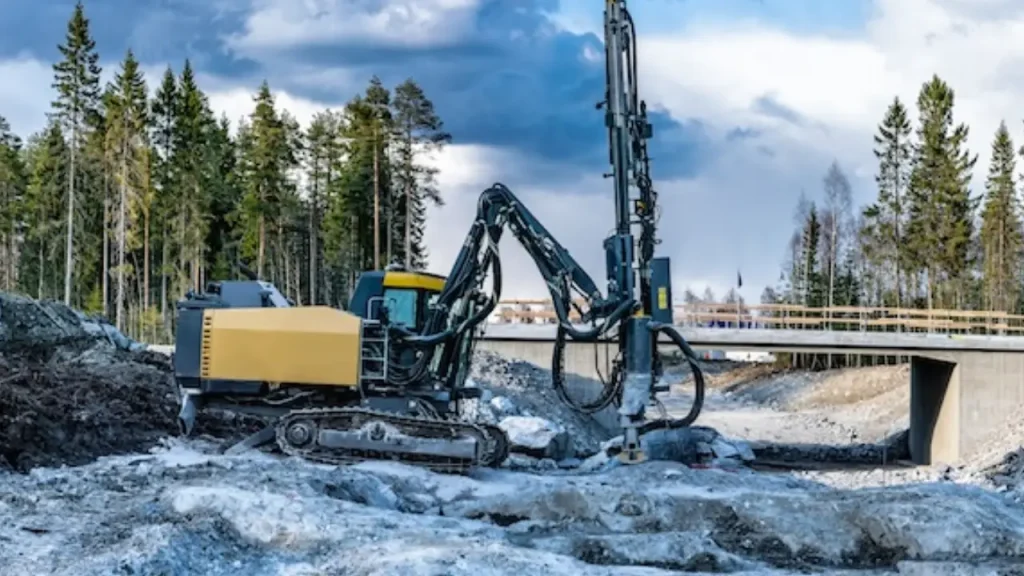
Rock formations are naturally occurring arrangements of rocks that have developed over millions of years through geological processes such as sedimentation, erosion, and volcanic activity. These formations vary in composition, hardness, and structure, ranging from soft sedimentary rocks like sandstone to hard igneous rocks like granite.
Understanding rock formations is crucial for industries like mining, construction, and drilling. Different formations require specific techniques and tools to extract resources or create foundations efficiently. By studying rock type, density, and layering, engineers and geologists can select the most suitable drilling equipment and methods for safe, precise, and cost-effective operations.
Different Types of Rock Formations
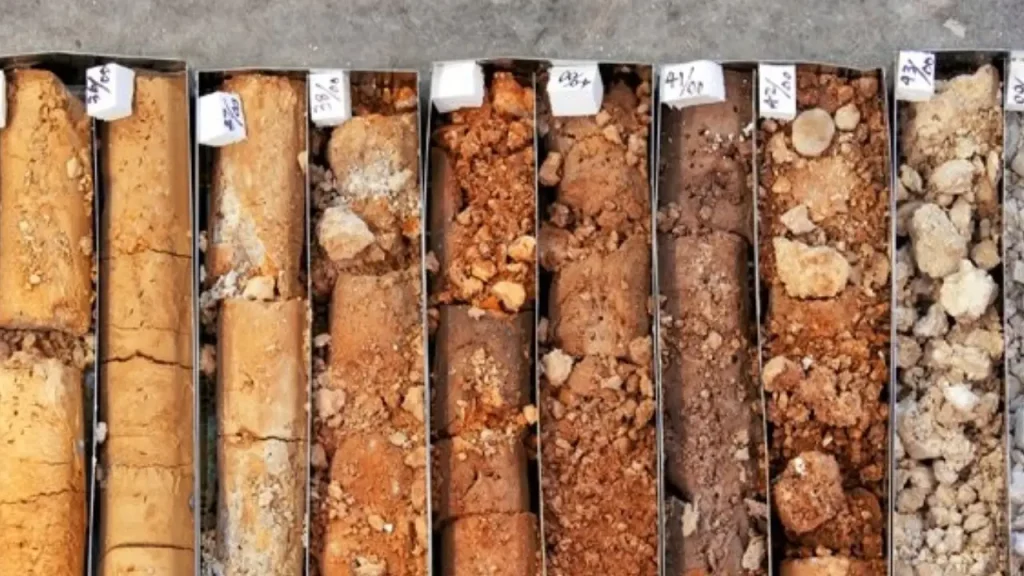
Rock formations are classified based on their origin, composition, and physical characteristics. Understanding the different types helps engineers, geologists, and drilling operators choose suitable tools and techniques for efficient, safe, and cost-effective operations. Each rock type presents unique challenges, requiring specialized drill bits and methods for optimal penetration and performance.
Volcanic Rocks
Volcanic rocks are formed from lava that cools rapidly on the Earth’s surface, such as basalt, pumice, and obsidian. They are generally hard and abrasive, requiring durable, wear-resistant drill bits for efficient drilling.
Drilling through volcanic rocks often presents challenges due to variable density and occasional fractures. Using bits designed for high impact and abrasion resistance ensures steady penetration, reduces tool wear, and maintains consistent performance in construction, mining, and geological exploration projects.
Igneous Intrusive Rocks
Intrusive igneous rocks, like granite and diorite, form when magma cools slowly beneath the Earth’s surface. They are extremely dense and hard, making drilling operations more challenging without proper equipment.
Drilling these rocks requires robust, high-performance bits capable of withstanding intense pressure and abrasion. Correct bit selection enhances penetration efficiency, reduces maintenance costs, and ensures precise results in large-scale mining or construction foundations.
Clastic Sedimentary Rocks
Clastic sedimentary rocks are composed of fragments of pre-existing rocks cemented together, such as sandstone and conglomerate. Their hardness varies, with some layers requiring specialized drill bits for effective penetration.
When drilling clastic rocks, operators must account for layered structures and possible weak zones. Using bits optimized for moderate hardness and fast drilling speeds ensures consistent performance, minimal downtime, and accurate hole formation across varying layers.
Chemical and Organic Sedimentary Rocks
These rocks form from mineral precipitation or accumulation of organic material, like limestone, chalk, or coal. Their relatively softer composition allows faster drilling, but careful bit selection prevents clogging and ensures smooth operation.
Drilling in chemical and organic sedimentary rocks focuses on efficiency and precision. Bits designed for soft to moderately hard materials optimize drilling speed, reduce wear, and maintain clean cuts, which is critical for exploration, construction, and resource extraction projects.
Suitable Drill Bits for Different Rock Formations
Selecting the right drill bit for each rock formation is essential for efficient, safe, and cost-effective drilling. Different rocks vary in hardness, abrasiveness, and structure, requiring specific bit types. Choosing suitable drill bits improves penetration speed, reduces wear, and ensures consistent performance across mining, construction, and geological projects.
- Hard Igneous Rocks: For rocks like granite and basalt, we recommend roller cone bits or PDC bits with high wear resistance. These bits withstand extreme hardness, maintain cutting efficiency, and provide reliable performance, reducing downtime and equipment wear during intensive drilling operations in mining or construction projects.
- Soft Sedimentary Rocks: For sandstone, limestone, and shale, we suggest drag bits or tri-cone bits with smoother cutting edges. These bits allow faster penetration, reduce energy consumption, and maintain hole stability, ensuring efficient drilling while minimizing bit wear and operational interruptions.
- Metamorphic Rocks: Marble, slate, and gneiss require versatile bits such as PDC or hybrid bits. We design these bits to handle varying hardness, prevent excessive tool wear, and deliver stable, precise drilling, particularly in tunneling, foundation, or mining projects where rock properties may change abruptly.
- Volcanic Rocks: Basalt, pumice, and obsidian need high-impact resistant roller cone bits or tungsten carbide PDC bits. These bits manage variable density and fractures, ensuring smooth penetration, consistent performance, and long-lasting durability even in abrasive, unpredictable formations.
- Clastic Sedimentary Rocks: Sandstone and conglomerate formations benefit from drag bits with optimized tooth patterns. We ensure these bits cut efficiently through layered or cemented fragments, maintaining drilling stability, preventing clogging, and reducing overall operational time.
- Chemical and Organic Sedimentary Rocks:Limestone, chalk, and coal formations are best drilled with tri-cone bits or soft-material PDC bits. We provide bits that minimize clogging, improve penetration speed, and ensure precise and efficient drilling for exploration, construction, or extraction purposes.
Suitable Drill Bits for Different Rock Formations
| Rock Formation | Hardness | Recommended Drill Bit Type | Key Features |
|---|---|---|---|
| Hard Igneous Rocks (Granite, Basalt) | Very Hard | Roller Cone, PDC Bits | High wear resistance, precise cutting, durable |
| Soft Sedimentary Rocks (Sandstone, Shale) | Soft | Drag Bits, Tri-Cone Bits | Smooth penetration, energy-efficient, stable |
| Metamorphic Rocks (Marble, Slate) | Moderate-Hard | PDC, Hybrid Bits | Versatile, stable drilling, reduced wear |
| Volcanic Rocks (Basalt, Pumice) | Hard/Abrasive | Roller Cone, Tungsten Carbide PDC Bits | High impact resistance, long-lasting durability |
| Clastic Sedimentary Rocks (Sandstone, Conglomerate) | Moderate | Drag Bits | Optimized tooth pattern, stable, efficient |
| Chemical & Organic Sedimentary Rocks (Limestone, Coal) | Soft-Moderate | Tri-Cone, Soft-Material PDC Bits | Fast penetration, minimal clogging, precise |
Suitable Drill Bits for Different Rock Hardness
Choosing the right drill bit based on rock hardness is essential for efficient and safe drilling. Different hardness levels demand specific bit types and cutting structures. Proper selection improves penetration speed, reduces wear, and ensures consistent performance, making drilling operations more cost-effective and reliable across mining, construction, and exploration projects.
- Soft Rocks: For soft rocks like clay, chalk, or soft limestone, we recommend tri-cone or soft-material PDC bits. These bits provide smooth penetration, reduce clogging, and maintain hole stability, enabling faster drilling with minimal wear and improved efficiency in soft formations.
- Medium-Hard Rocks: For medium-hard rocks such as sandstone, shale, or marble, drag bits or hybrid PDC bits work best. We design these bits to balance penetration speed and durability, ensuring stable drilling, reduced bit wear, and consistent performance in variable geological conditions.
- Hard Rocks: Hard rocks like granite, basalt, and quartzite require high-performance roller cone bits or tungsten carbide PDC bits. These bits resist wear, maintain cutting efficiency, and provide reliable drilling performance, even under extreme pressure and abrasive conditions in mining and construction projects.
- Very Hard Rocks: Extremely hard rocks, including some igneous and metamorphic formations, demand specialized PDC or impregnated bits. We engineer these bits for maximum durability, precise cutting, and high penetration efficiency, ensuring long-lasting performance while minimizing downtime and operational costs.
- Abrasive Rocks: For highly abrasive formations such as sandstone with quartz content or volcanic rocks, we recommend tungsten carbide bits or hybrid PDC bits. These bits withstand surface wear, maintain drilling speed, and ensure consistent results in challenging, high-abrasion conditions.
Suitable Drill Bits for Different Rock Hardness
| Rock Hardness Level | Example Rocks | Recommended Drill Bit Type | Key Features |
|---|---|---|---|
| Soft | Clay, Chalk, Soft Limestone | Tri-Cone, Soft-Material PDC Bits | Smooth penetration, minimal clogging, stable |
| Medium-Hard | Sandstone, Shale, Marble | Drag Bits, Hybrid PDC Bits | Balanced durability, stable drilling, efficient |
| Hard | Granite, Basalt, Quartzite | Roller Cone, Tungsten Carbide PDC | High wear resistance, precise cutting, durable |
| Very Hard | Gneiss, Diorite, Some Igneous Rocks | Specialized PDC, Impregnated Bits | Maximum durability, high penetration, long-lasting |
| Abrasive | Volcanic Rocks, Quartz-Rich Sandstone | Tungsten Carbide, Hybrid PDC Bits | Resists wear, maintains speed, consistent results |
How to Choose Suitable for Different Rock Formations?
Selecting the right drill bit for specific rock formations is essential for efficient, safe, and cost-effective drilling. Each rock type—soft, medium, hard, or abrasive—requires specialized bits with proper materials, design, and compatibility. Correct selection ensures precise penetration, minimal wear, and reliable performance across mining, construction, and geological projects.
- Assess Rock Type and Hardness: We evaluate the formation’s hardness and structure before recommending a bit. By understanding whether the rock is soft, medium, hard, or abrasive, we match it with a bit designed for efficient penetration, reduced tool wear, and consistent, reliable drilling results.
- Match Drill Bit Material: We choose drill bits with materials suited for specific formations. Tungsten carbide and PDC bits handle hard and abrasive rocks, while softer formations benefit from tri-cone or soft-material bits, improving durability, cutting efficiency, and operational safety during all drilling operations.
- Consider Cutting Structure and Design: We assess cutting angles, tooth geometry, and bit profiles to match rock types. Proper design optimizes penetration, reduces energy consumption, prevents excessive wear, and ensures efficient drilling performance while extending the service life of both bits and equipment.
- Evaluate Drilling Method Compatibility: We ensure the chosen bit works with your drilling technique, whether rotary, percussion, or hybrid. Compatibility enhances torque transfer, stability, and control, enabling operators to drill safely and efficiently while maximizing bit performance in challenging rock formations.
- Consult Manufacturer Recommendations: We rely on expert guidance from manufacturers for optimal bit selection. Manufacturer insights on performance, rock-specific advice, and operational conditions help choose the most suitable drill bit, ensuring reliable, cost-effective, and long-lasting results for all drilling projects.
Conclusion
Choosing the right drill bit for various rock formations is essential for achieving reliable and efficient drilling outcomes. By understanding rock hardness, abrasiveness, and formation type, you can select bits that minimize wear, enhance penetration, and maintain consistent performance. Proper bit selection directly impacts project timelines and operational costs.
Investing in high-quality, purpose-built drill bits ensures both durability and safety during drilling operations. Using bits designed for specific rock conditions reduces equipment failure, prevents costly downtime, and maximizes productivity. Operators can achieve precise and stable drilling results while protecting machinery and improving overall project efficiency.
Get wholesale drill bits for drilling different rock formations from our Sinodrills. We provide durable, efficient, and high-performance bits tailored for mining, construction, and geological projects. With expert guidance and customizable options, Sinodrills helps you achieve reliable drilling outcomes, cost savings, and long-lasting operational success in every challenging rock formation.

